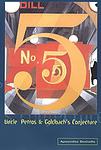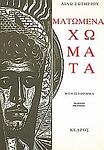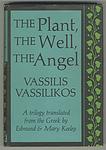The Greatest Czech, Greek "Fiction" Books Since 1950
Click to learn how this list is calculated.
This list represents a comprehensive and trusted collection of the greatest books. Developed through a specialized algorithm, it brings together 300 'best of' book lists to form a definitive guide to the world's most acclaimed books. For those interested in how these books are chosen, additional details can be found on the rankings page.
Genres
Countries
Date Range
Reading Statistics
Click the button below to see how many of these books you've read!
Download
If you're interested in downloading this list as a CSV file for use in a spreadsheet application, you can easily do so by clicking the button below. Please note that to ensure a manageable file size and faster download, the CSV will include details for only the first 500 books.
Download-
1. The Unbearable Lightness of Being by Milan Kundera
Set against the backdrop of the Prague Spring period of Czechoslovak history, the novel explores the philosophical concept of Nietzsche's eternal return through the intertwined lives of four characters: a womanizing surgeon, his intellectual wife, his naïve mistress, and her stoic lover. The narrative delves into their personal struggles with lightness and heaviness, freedom and fate, love and betrayal, and the complexities of human relationships, all while offering a profound meditation on the nature of existence and the paradoxes of life.
-
2. Franz Kafka: The Complete Stories by Franz Kafka
This collection of stories offers a comprehensive look at the work of a renowned author, known for his surreal and often unsettling depictions of modern life. The stories explore themes of existential anxiety, guilt, and absurdity, often through narratives in which ordinary people face extraordinary, inexplicable circumstances. The collection showcases the author's unique style and his profound influence on 20th-century literature.
-
3. The Book of Laughter and Forgetting by Milan Kundera
This novel is a blend of fiction, autobiography, and philosophical musings that explores the nature of forgetting, the power of laughter, and the struggle for personal and political freedom. Set against the backdrop of the political turmoil in Czechoslovakia in the 20th century, it follows the interconnected stories of various characters, including a man who is expelled from the Communist Party, a young woman in love with a man whose father was a political prisoner, and a couple who flee to America. Throughout, the book delves into the ways in which personal and collective memories shape identity and history.
-
4. The Last Temptation of Christ by Nikos Kazantzakis
This novel presents an alternative interpretation of the life of Jesus Christ, who is depicted as a conflicted, all-too-human figure who struggles with his divine destiny. The book explores his journey through life, his friendships, his fears, and his ultimate temptation to avoid crucifixion and live a normal life. The narrative delves into the psychological and emotional aspects of his experiences, creating a complex, humanized portrayal of a traditionally divine figure.
-
5. The Joke by Milan Kundera
"The Joke" follows the life of Ludvik Jahn, a man expelled from the Czechoslovak Communist Party, his university, and the army for a harmless joke he sends in a postcard to a girlfriend. The narrative explores his life before, during, and after his punishment, and his attempts to exact revenge on those who wronged him. Set against the backdrop of the Prague Spring and the Soviet Invasion, the novel delves into the themes of political satire, the absurdity of totalitarianism, and the individual's struggle against an impersonal and oppressive system.
-
6. Z by Vassilis Vassilikos
"Z" is a political novel that explores the events surrounding the assassination of a prominent leftist politician in Greece. The story delves into the corruption and violence that pervades the government, with the narrative alternating between the perspectives of the victim, the assassins, the investigators, and the government officials involved. The novel is a critique of political tyranny and an exploration of the struggle for justice in a corrupt system.
-
7. Closely Watched Trains by Bohumil Hrabal
"Closely Watched Trains" is a darkly humorous tale set in Nazi-occupied Czechoslovakia during World War II. It follows the life of a young, inexperienced railway worker who is struggling with his sexual awakening while dealing with the harsh realities of war. The novel is a poignant exploration of the absurdity of life, the tragicomedy of human existence, and the power of ordinary people to resist oppression.
-
8. I Served The King Of England by Bohumil Hrabal
"I Served The King Of England" is a captivating novel that follows the life of a young Czech waiter named Ditie, who dreams of becoming a millionaire and serving the highest-ranking clientele. Set against the backdrop of World War II and the Communist regime, the story takes readers on a journey through Ditie's experiences in various hotels and restaurants, his encounters with eccentric characters, and his pursuit of love and success. With humor, wit, and a touch of satire, the book explores themes of ambition, identity, and the impact of historical events on an individual's life.
-
9. The Third Wedding by Kōstas Tachtsēs
"The Third Wedding" is a powerful exploration of love, passion, and societal expectations set in mid-20th century Greece. The story revolves around a strong-willed and independent woman who has been married twice and is about to enter her third marriage. The narrative delves into her past love affairs, her struggle with the societal norms of the time, and her quest for personal freedom. The book is a poignant commentary on the condition of women in a patriarchal society and the sacrifices they make in the name of love and duty.
-
10. The Engineer of Human Souls by Josef Škvorecký
The novel is a semi-autobiographical narrative of a Czechoslovakian writer who has become a professor at a Canadian university, teaching American literature. The narrative switches between his current life in Canada and his memories of the past in Czechoslovakia, including the Nazi occupation and the Communist regime. The book presents a complex portrayal of the life of an intellectual in exile and the challenges of cultural assimilation, while also exploring themes of love, politics, and the power of literature.
-
11. Too Loud A Solitude by Bohumil Hrabal
The narrative centers around an elderly man who has spent his life compacting paper and books into bales in a decrepit cellar, using a hydraulic press. Despite the menial nature of his job, he has cultivated a deep love and profound knowledge for literature, philosophy, and art from the books that pass through his hands, many of which he rescues from destruction. The story is a poignant exploration of the power and resilience of the human spirit in the face of a dehumanizing, totalitarian regime, and a meditation on the enduring value of art and the written word. The protagonist's intellectual journey and his resistance to the oppressive forces around him serve as a metaphor for the survival of culture and individuality under oppressive conditions.
-
12. Cutting It Short by Bohumil Hrabal
Set in a small Czech town during the 1920s, the narrative follows the life of a vivacious and free-spirited young woman married to the town's brewery manager. Her playful and unconventional behavior often leads to humorous and sometimes scandalous situations, as she navigates through the social norms and expectations of the time. The story captures the charm and eccentricities of rural life through a series of anecdotes, reflecting on the themes of freedom, tradition, and the joy of the everyday. The protagonist's zest for life and her interactions with the colorful cast of characters create a whimsical and endearing portrait of a community on the brink of modernization.
-
13. The Daughter by Pavlos Matesis
"The Daughter" is a powerful novel set in Greece during the Second World War. The narrative follows the life of a young girl who is forced to grow up quickly due to the harsh realities of war. Her father, a communist, is executed by the Germans, and the girl is left to navigate the complexities of life, politics, and love in a world that is rapidly changing. The book offers a poignant exploration of the human capacity for resilience, survival, and hope in the face of unimaginable adversity.
-
14. Astradeni by Eugenia Fakinou
"Astradeni" is a coming-of-age novel set in post-World War II Greece. The story follows the life of a young girl named Astradeni, who is forced to grow up quickly due to the harsh realities of war and poverty. Despite the hardships she faces, Astradeni maintains a hopeful and imaginative spirit, often escaping into a world of myths and legends. The novel explores themes of resilience, the power of storytelling, and the enduring strength of the human spirit.
-
15. Uncle Petros and Goldbach's Conjecture by Apostolos Doxiadis
The novel follows the story of a young man who becomes fascinated by his reclusive and eccentric Uncle Petros. As he delves into his uncle's past, he uncovers Petros' obsession with proving Goldbach's Conjecture, a famous unsolved problem in number theory. This obsession led to Petros' alienation from society and ultimately his downfall. The book explores themes of mathematical obsession, family relationships, and the fine line between genius and madness.
-
16. The Story Of Andreas Kordopatis by Thanassis Valtinos
This novel unfolds the life journey of Andreas Kordopatis, tracing his odyssey from his origins in the Peloponnese, through his ventures in the United States and his return to Greece. Set against the backdrop of the late 19th and early 20th centuries, the narrative weaves through the personal and historical, exploring themes of migration, identity, and the pursuit of a better life. Through a blend of personal accounts, letters, and third-person narration, the reader is immersed in the struggles and aspirations of a man navigating the complexities of diaspora and the relentless quest for home and belonging amidst the turbulent tides of history.
-
17. The End Of Our Small Town by Dimitris Hatzis
This novel delves into the profound transformation of a small Greek town during the tumultuous period of the Greek Civil War and the subsequent years, reflecting on the broader socio-political upheavals of Greece in the mid-20th century. Through the eyes of its inhabitants, the narrative explores themes of love, betrayal, and the struggle for survival amidst changing political tides. The story captures the essence of human resilience and the impact of historical events on personal lives and community bonds, painting a vivid picture of a town and its people navigating the challenging journey from a traditional past towards a modern identity.
-
18. Drifting Cities by Stratis Tsirkas
Set against the backdrop of World War II and the subsequent civil war in Greece, this novel weaves together the lives of a diverse group of characters who find themselves in Jerusalem, Cairo, and Alexandria. Through their interconnected stories, the narrative explores themes of identity, displacement, and the quest for personal and political freedom. The cities, each with their own unique atmosphere and challenges, serve as more than mere settings; they are integral to the characters' experiences, reflecting the broader historical and cultural shifts of the mid-20th century. As these individuals navigate love, betrayal, and the struggle for a sense of belonging, the book offers a rich tapestry of human resilience and the complexities of home in times of turmoil.
-
19. Το Τρίτο Στεφάνι by Kostas Taktsis
This novel is a poignant exploration of the complexities of love, societal norms, and personal identity in post-war Greece. Through the eyes of its protagonist, a young man navigating his sexual identity amidst the conservative and often oppressive societal expectations of the time, the narrative delves into themes of love, loss, and the search for personal freedom. Set against the backdrop of Athens in the mid-20th century, the story weaves together the protagonist's intimate experiences with broader social and political changes, offering a deeply human and moving portrayal of the struggle for self-acceptance and the courage to live authentically.
-
20. Ματωμένα Χώματα by Dido Sotiriou
This novel is a poignant narrative set against the backdrop of the Greco-Turkish War and the subsequent population exchange between Greece and Turkey in the early 20th century. It tells the harrowing story of a Greek family living in Asia Minor who are forced to flee their ancestral home amidst the violence and upheaval of the time. Through their journey, the book explores themes of identity, loss, and the enduring human spirit in the face of displacement and tragedy. The narrative serves as a powerful testament to the resilience of individuals caught in the crossfire of historical events, and a reminder of the personal stories behind the broad strokes of history.
-
21. The Flaw by Antonis Samarakis
The book is a gripping narrative set in an unnamed totalitarian state, where the protagonist, a government clerk, finds himself inadvertently embroiled in a complex web of political intrigue and moral dilemmas after discovering a minor error in a routine report. This seemingly insignificant flaw sets off a chain of events that exposes the oppressive and corrupt nature of the regime, challenging the protagonist's loyalties and beliefs. As he navigates through a dangerous landscape of surveillance, betrayal, and resistance, the story explores themes of power, conscience, and the human spirit's resilience against authoritarianism. Through its tense and thought-provoking plot, the novel serves as a poignant critique of totalitarian systems and a testament to the individual's struggle for justice and freedom.
-
22. Ο Εξώστης by Nikos Kakhtitsis
This novel delves into the life of a young man grappling with his sexual identity amidst the conservative and oppressive societal norms of mid-20th century Greece. Through a series of introspective monologues and vivid encounters, the protagonist navigates the complexities of desire, shame, and the longing for acceptance. Set against the backdrop of post-war Greece, the narrative explores themes of alienation, the struggle for self-realization, and the quest for freedom in a rigidly structured society. The protagonist's journey is a poignant reflection on the human condition, offering a deep exploration of the internal and external conflicts arising from societal expectations and personal identity.
-
23. Η Σαρκοφαγος by Giorgos Ioannou
This book delves into the complexities of human nature, society, and the existential dilemmas faced by individuals in post-war Greece. Through a series of interconnected stories, the narrative explores themes of loss, despair, and the search for meaning in a world marked by political turmoil and social change. The author masterfully portrays the struggles of ordinary people trying to find their place in a rapidly evolving society, using vivid imagery and deep psychological insight to bring his characters to life. The work is a poignant reflection on the human condition, offering a critical look at the challenges of adapting to a new reality while clinging to the remnants of the past.
-
24. Η κρύπτη by Ε.Χ. Γονατάς
The book unfolds within the mysterious and eerie confines of a crypt, where secrets from the past and present intertwine. As the protagonist delves deeper into the crypt's enigmatic depths, they encounter a series of cryptic clues and supernatural occurrences that challenge their understanding of reality. The narrative masterfully blends elements of horror, mystery, and historical fiction, leading readers on a suspenseful journey through time and darkness. The crypt, with its ancient allure and hidden dangers, becomes a character in its own right, revealing truths that are as unsettling as they are enlightening, ultimately confronting the protagonist with a revelation that could alter their perception of life and death.
-
25. The Plant, The Well, The Angel by Vassilis Vassilikos
This novel weaves a complex narrative that explores the interconnectedness of human life, nature, and the divine. Through the symbolic elements of a plant, a well, and an angel, the story delves into themes of growth, discovery, and spiritual awakening. Set against a backdrop that blends the mundane with the mystical, the narrative follows the journey of its characters as they navigate personal and collective challenges, ultimately seeking redemption and enlightenment. The author masterfully uses these symbols to reflect on the essence of existence, the cycles of life, and the pursuit of meaning in a world filled with both beauty and hardship.
Reading Statistics
Click the button below to see how many of these books you've read!
Download
If you're interested in downloading this list as a CSV file for use in a spreadsheet application, you can easily do so by clicking the button below. Please note that to ensure a manageable file size and faster download, the CSV will include details for only the first 500 books.
Download

















